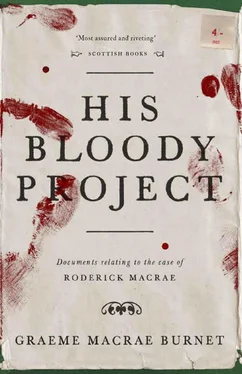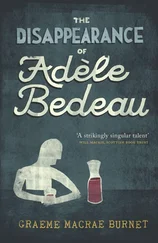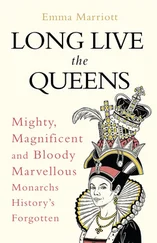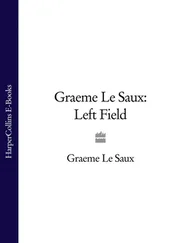I began by telling R— M— that I was curious about the literary project upon which he had embarked. He replied that he was only writing the pages because Mr Sinclair had instructed him to do so. I retorted that that did not seem an adequate explanation for the dedication which he had shown towards the task. At this, the prisoner gestured around the cell and replied, ‘As you can see, sir, there is little else with which to amuse myself here.’
‘So it amuses you to write these pages?’ said I.
To this he made no response. He sat quite erect on the bench, his gaze directed at the wall in front of him, rather than at his interlocutor. I then told him I wished to ask some questions about the deeds which had brought him to this place. His little eyes flickered momentarily towards me, but other than that there was no alteration in his bearing.
‘I understand from Mr Sinclair that you do not deny responsibility for these crimes,’ I said.
‘I do not,’ he replied. His eyes remained firmly fixed on the wall in front of him.
‘May I ask,’ I said, ‘what led you to commit such violent acts?’
‘I wished to deliver my father from the tribulations which he had lately suffered.’
‘And what was the nature of these tribulations?’
R— M— then described a series of trivial disputes which had occurred over a period of months between his father and the deceased.
‘And you felt justified, in view of these incidents, in doing Mr Mackenzie to death?’
‘I could see no other course of action open to me,’ said R— M—.
‘Might you not have sought out some authority in your community to act as an intermediary in these matters?’
‘Mr Mackenzie was the authority in our community.’
‘You seem to be an intelligent young man,’ I said. ‘Could you not have sought to resolve these disagreements through reasoning with Mr Mackenzie?’
R— M— smiled at this suggestion.
‘Did you make any attempt to reason with Mr Mackenzie?’
‘I did not.’
‘Why not?’
‘If you had had the opportunity to meet Mr Mackenzie, you would not ask such a question.’
‘Did you carry out the killing of Mr Mackenzie at the behest of your father?’ I asked.
R— M— shook his head wearily.
‘Did you discuss your plan with any other person?’
‘I would not say that I had a plan,’ he responded.
‘But you proceeded to Mr Mackenzie’s house armed with weapons. You must have had it in your mind to do some harm to him.’
‘I did.’
‘Then that surely constitutes a plan, does it not?’ I spoke these words in an affable tone, as if we were merely engaged in a friendly discussion of a matter of mutual interest. I did not wish to set the prisoner against me by seeming to attempt to wrong-foot him.
‘I went to Mr Mackenzie’s house with the intention of killing him, but I would not say that I had a plan.’
I feigned some bemusement at the minute distinction he was making, and asked if he could explain what he meant.
‘I simply mean that while I had the intention’ — he gave this last word a special emphasis, as if it was he, rather than I, who was conversing with his inferior — ‘to do him harm, I had not formulated a plan as such. I went to Mr Mackenzie’s house thus armed only to discover what would happen if I did so.’
‘So, you believe then that you are not wholly responsible for Mr Mackenzie’s death — that it was, to some degree, a matter of chance.’
‘You might as well say that everything that happens is a matter of chance,’ said the prisoner.
‘But was it happenstance that put a croman in your hand and led you to enter Mr Mackenzie’s house?’
‘It was a matter of chance that I happened to have a croman in my hand before I set off.’
‘And this second weapon —’
‘The flaughter,’ Mr Sinclair interjected.
‘It was not,’ I continued, ‘chance that put the flaughter in your hand.’
R— M— replied in a bored tone, ‘The flaughter was propped against the gable of our house.’
‘Nevertheless,’ I insisted, ‘you took it up. It was not chance that put it in your hand. ’
‘No.’
‘Because you planned to kill Mr Mackenzie.’
‘It is true that I wanted Mr Mackenzie to die by my hand. If you wish to call that a plan, you are free to do so. I merely wished to give my undertaking every chance of success.’
I nodded sagely at this parody of logic. ‘And were you pleased by this success?’
‘I was not displeased,’ said R— M—.
‘But you cannot be pleased to be incarcerated in this cell.’
‘That is a matter of no consequence,’ he declared.
‘You understand that your actions and your statements about them will likely lead you to the gallows?’
To this, R— M— made no response. Whether his diffident attitude was feigned or was the product of some misplaced bravado, I could not say. Nor could I say at this point whether the matter-of-fact answers he had given were entirely ingenuous, or due to some ploy to seem quite out of his mind; that he calculated that by admitting so openly to such brutal acts, he would be pronounced not to be in possession of his reason.
I then turned to the other victims of R— M—’s assault.
‘You have stated that you wished to murder Mr Mackenzie and I understand that in your own mind you were justified in doing so, but to kill a young girl and an infant is a quite different matter. Did you also bear some grievance against Flora or Donald Mackenzie?’
‘I did not.’
‘Then to do them to death is quite monstrous,’ I said.
‘I acted only out of necessity,’ he replied.
‘Out of necessity?’ I repeated. ‘Would it not have been possible for a powerful young man like yourself to restrain a young girl and a small boy?’
‘With the benefit of hindsight it might seem so. Perhaps if I had had a plan, as you call it, that might have been possible. As it was, this was merely the way it transpired.’
‘So, in order to carry out your goal of killing Mr Mackenzie, you were willing to murder two individuals who, in even your own eyes, were entirely blameless.’
‘It was not my intention to kill them,’ he replied, ‘but I had no choice in the matter.’
‘You acted only out of necessity?’
The prisoner shrugged his shoulders as if he was growing weary of humouring me. ‘If you wish to put it that way, then, yes, I killed them out of necessity.’
At this point I took from my satchel the medical reports, quite ably compiled by a local practitioner, detailing the injuries sustained by the victims. I then read to the prisoner a paragraph detailing injuries to Flora Mackenzie too obscene to relate in these pages. ‘What is described here seems to greatly exceed the demands of necessity,’ I said.
R— M— had thus far sat quite motionless on his bunk, his gazed fixed on the cell wall. On hearing this account of the wounds he had inflicted, however, his eyes darted rapidly to and fro, and his hands, which until then had rested on his lap, began to worry at the material of his breeches.
‘Can you explain why you felt the necessity to inflict such injuries?’ I asked, maintaining an even and affable tone.
The colour rose to the prisoner’s cheeks. It is often the case that even inmates who are capable of exercising control over their verbal statements are unable to suppress the physical manifestations of anxiety. R— M— cast his eyes about the cell, as though searching for an answer to my question.
‘I do not recall inflicting such injuries,’ he replied after some moments and in a quieter voice than that with which he had previously spoken.
‘But you must have inflicted them,’ I said.
Читать дальше












